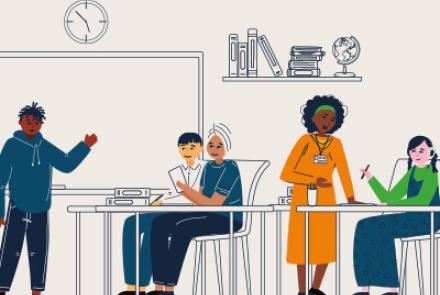How the Autistic and OK programme promotes autism acceptance in schools
Unfortunately, it’s become all too common for autistic pupils to leave school earlier than planned, despite wanting and needing an education. This is often due to a lack of understanding by both teachers and other pupils.
I firmly believe it should be a requirement to have autism acceptance taught in schools. It’s important for children to learn about and accept differences in others.
My experience of mainstream school as an autistic young person
Based on my experience of being an autistic pupil at a mainstream school, a lack of understanding of autism was common among teaching staff and pupils.
Throughout my time in school, there was no lesson, workshop, assembly, or even speech about autism. Nobody mentioned what it really is, and nobody debunked the misconceptions about autism that so many people in my school held as beliefs.
It felt my autistic traits that the school should have been aware of (as I was diagnosed when I was three) were being treated as something that was so alien. I felt like an outcast and sometimes humiliated.
Getting an Education, Health and Care plan
Even at my secondary school, it was clear staff members hadn’t received any autism acceptance training. My mum had frequently asked for me to receive an Educational Health and Care (EHC) plan but it was denied by the school for six consecutive years.
I was deemed “too intelligent” to need an EHC plan, despite my grades, and more importantly, my mental health plummeting due to the lack of support. This demonstrated the lack of support for the needs of autistic pupils at my school.
How the Autistic and OK programme can help
Autistic and OK is a free programme for secondary schools which aims to build a whole-school community where autistic pupils feel understood and accepted. I was part of a group of 15 autistic Youth Advisors who helped co-develop the resources in the Autistic and OK toolkit.
The toolkit contains an educational assembly session on autism for all pupils. I believe this assembly session will promote autism acceptance in schools, as it provides a factual account on autism, from autistic young people themselves, via a video format designed to be engaging for young viewers.
I think the most valuable element of the video itself is the fact it explains to pupils that they probably already know autistic people in or outside their school lives. This is a good way of communicating to many pupils who might not think they know much about autism, that they may have already unknowingly met an autistic person.
Another beneficial aspect of the programme is that each of the peer-led sessions have been planned in such specific detail by the team of autistic Youth Advisors which I am so glad to be a part of.
Each of our ideas were listened to, respectfully discussed and ultimately were used to determine the best way to plan the sessions so autistic young people feel empowered to look after their mental health and wellbeing while in school.
Find out more about the Autistic and OK programme.
About the author
Harvey was diagnosed with autism in 2006 at the age of three, he is extremely passionate about campaigning for autism acceptance in society. He is a Youth Advisor for the Autistic and OK programme and has been a committed member of the team co-developing the toolkit resources.












